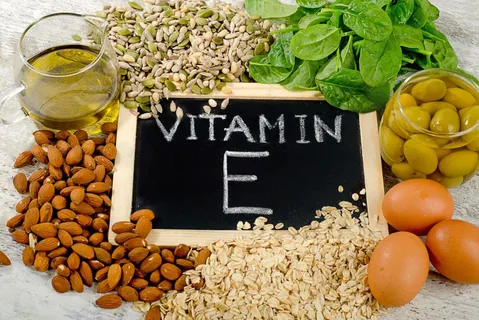Vitamin E, a vital nutrient, plays a significant role in maintaining skin health and providing robust protection against various environmental and internal stressors. This guide will delve into the importance of vitamin E for skin protection, exploring its benefits, sources, and how it works to keep your skin healthy and radiant.
What is Vitamin E?
Vitamin E is a group of eight fat-soluble compounds, including four tocopherols and four tocotrienols. It is a powerful antioxidant that helps combat free radicals, which are unstable molecules that can damage cells, leading to aging and various skin conditions.
Types of Vitamin E
- Alpha-tocopherol: The most active form in humans, commonly found in supplements and skincare products.
- Beta-tocopherol, Gamma-tocopherol, and Delta-tocopherol: Other tocopherol forms, each with unique properties and benefits.
- Tocotrienols: Less common but potent antioxidants, found in certain oils and grains.
Benefits of Vitamin E for Skin Protection
Antioxidant Properties
Vitamin E is renowned for its antioxidant properties. It neutralizes free radicals, preventing oxidative stress that can lead to premature aging, fine lines, and wrinkles. By protecting the skin from environmental aggressors like UV rays and pollution, vitamin E helps maintain a youthful appearance.
Moisturizing and Healing
Vitamin E is an excellent moisturizer, enhancing the skin’s ability to retain water. This hydration boost is crucial for maintaining a healthy skin barrier, which protects against irritants and infections. Additionally, vitamin E aids in the healing of scars and wounds, promoting faster recovery and reducing the appearance of blemishes.
Anti-Inflammatory Effects
Vitamin E has anti-inflammatory properties that can soothe irritated skin and reduce redness. This makes it beneficial for conditions like eczema, psoriasis, and other inflammatory skin disorders.
UV Protection
While vitamin E is not a substitute for sunscreen, it can enhance the skin’s defense against UV damage. It absorbs some UVB light and, in combination with vitamin C, can offer a higher level of protection against sunburn and photoaging.
Skin Barrier Support
The skin barrier is essential for protecting against pathogens and retaining moisture. Vitamin E strengthens this barrier, ensuring the skin remains resilient and less susceptible to damage.
Sources of Vitamin E
Dietary Sources
Incorporating vitamin E-rich foods into your diet is an effective way to boost your intake. Some excellent dietary sources include:
- Nuts and Seeds: Almonds, sunflower seeds, and hazelnuts are particularly high in vitamin E.
- Vegetable Oils: Sunflower oil, safflower oil, and wheat germ oil are rich sources.
- Green Leafy Vegetables: Spinach, broccoli, and kale provide significant amounts of vitamin E.
- Fortified Foods: Some cereals and juices are fortified with vitamin E to help meet daily requirements.
Topical Sources
Topical application of vitamin E can provide direct benefits to the skin. Look for skincare products containing:
- Alpha-tocopherol: Often listed in ingredient lists, it is the most effective form for skin application.
- Tocopheryl Acetate: A stable form of vitamin E used in many skincare formulations.
- Natural Oils: Products containing oils like argan oil, jojoba oil, or almond oil can provide vitamin E benefits.
How to Use Vitamin E for Skin Protection
Choosing the Right Product
When selecting vitamin E skincare products, consider your skin type and specific needs. Those with dry skin may benefit from heavier formulations like oils or creams, while those with oily or acne-prone skin might prefer lighter serums or lotions.
Application Tips
- Cleanse First: Always apply vitamin E products to clean skin to ensure maximum absorption.
- Combine with Other Antioxidants: Pairing vitamin E with vitamin C can enhance its effectiveness and provide additional protection.
- Use Sunscreen: While vitamin E offers some UV protection, it is essential to use sunscreen for comprehensive sun defense.
Frequency of Use
Depending on the product and your skin’s tolerance, vitamin E can be used daily or several times a week. Pay attention to how your skin responds and adjust the frequency as needed.
Potential Side Effects and Considerations
Allergic Reactions
While rare, some individuals may experience allergic reactions to vitamin E, such as redness, itching, or swelling. If you have sensitive skin, perform a patch test before using a new product.
Overuse Concerns
Excessive use of vitamin E, especially in high concentrations, can sometimes lead to clogged pores and breakouts. Start with lower concentrations and gradually increase if your skin tolerates it well.
Consultation with a Dermatologist
If you have specific skin concerns or conditions, consult a dermatologist before incorporating new vitamin E products into your routine. They can provide personalized recommendations based on your skin type and needs.
FAQs
What are the primary benefits of vitamin E for skin protection?
Vitamin E offers antioxidant protection, moisturizes the skin, reduces inflammation, aids in healing, and supports the skin barrier, making it an essential nutrient for maintaining healthy and resilient skin.
Can I apply vitamin E directly to my skin?
Yes, vitamin E can be applied directly to the skin. However, it’s best to use products formulated with vitamin E to ensure proper absorption and avoid potential irritation from pure vitamin E oil.
How often should I use vitamin E on my skin?
The frequency of use depends on the product and your skin type. Generally, vitamin E can be used daily or several times a week. Start with a few times per week and adjust based on your skin’s response.
Can vitamin E help with acne scars?
Vitamin E can aid in the healing of acne scars by promoting skin regeneration and reducing inflammation. However, results vary, and it’s important to use it in conjunction with other treatments for best results.
Is vitamin E safe for all skin types?
Vitamin E is generally safe for most skin types, but those with very sensitive or acne-prone skin should use it with caution. Always perform a patch test before using a new product.
Can I get enough vitamin E from my diet alone?
While it’s possible to get sufficient vitamin E from a balanced diet rich in nuts, seeds, and green leafy vegetables, topical application can provide direct benefits to the skin and enhance its protective effects.
What should I look for in a vitamin E skincare product?
Look for products containing alpha-tocopherol or tocopheryl acetate, as these are the most effective forms for skin application. Consider your skin type and choose a formulation that suits your needs.
Can vitamin E protect against sun damage?
Vitamin E offers some protection against UV damage by absorbing UVB light and neutralizing free radicals. However, it should be used in conjunction with sunscreen for comprehensive sun protection.
Are there any side effects of using vitamin E on the skin?
Side effects are rare but can include allergic reactions or breakouts from overuse. Start with lower concentrations and perform a patch test to ensure compatibility with your skin.
How does vitamin E support the skin barrier?
Vitamin E strengthens the skin barrier by enhancing moisture retention and providing antioxidant protection. This helps keep the skin resilient and less susceptible to damage from environmental stressors.
Conclusion
Vitamin E is a powerhouse nutrient for skin protection, offering a range of benefits from antioxidant defense to moisturizing and healing properties. By incorporating vitamin E-rich foods into your diet and using targeted skincare products, you can harness its protective and rejuvenating effects. Whether you’re dealing with dry skin, inflammation, or simply looking to maintain a youthful complexion, vitamin E can be a valuable addition to your skincare routine. Always consider your individual skin needs and consult with a dermatologist for personalized advice.

